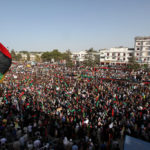Oral Intervention at the United Nations Human Rights Council- 15th Special Session- on Libya
Oral Intervention by CIHRS at the United Nations Human Rights Council- 15th Special Session- on Libya
In United Nations Human Rights Council by CIHRSFebruary 27, 2011Leave a Comment
Oral Intervention
25 February, 2011
Delivered by: Laila Matar (CIHRS, UN advocacy representative)
The Cairo Institute for Human Rights Studies is encouraged by the statement of the Organization of Islamic Conference and Arab Group made earlier today. We are further encouraged by the support of Jordan, Iraq, Qatar, Tunisia and Palestine for this Special Session, and the suspension of the Libyan delegation from the committees of the Arab League 3 days ago. The holding of this Special Session is a significant step in the right direction for this body. We strongly urge the Council to adopt the resolution before this Session as the minimal response required of this body.
The crimes against humanity currently be carried out by the Libyan government against its own people are tragic and deeply shocking. But perhaps the most tragic aspect of the brutality occurring in Libya is that these crimes were not unavoidable. Rather, they are the logical conclusion and penultimate expression of the way in which Arab governments and the international community have approached the wider regional phenomena of national popular protests that have been spontaneously occurring for the last 3 months.
In the words of the Jordanian Ambassador: Silence on human rights violations wherever they occur will inevitably lead to what we see in Libya.
Where was the OIC, Arab League, this Council and its member states when Tunisians took to the streets in December, 2010 and were beaten, arrested and killed by security forces? Where were you when the Egyptian government imposed an information blackout on its country? When hundreds of Egyptians were killed and thousands arbitrarily detained by security forces, many of whom remain disappeared? Where were you a few days ago when the governments of Bahrain and Yemen fired live ammunition into crowds of peaceful protestors, executing its own civilians in broad daylight?
The truth that this Special Session has failed to deal with and can not cover up is that what is happening in Libya is part of a regional, mass uprising against corruption and harsh repression by governments that often treat their own peoples as the enemy; governments that regularly torture, imprison and kill its own citizens; the truth that countries throughout the world, including the United States of America and European Union member states, have not only been complicit, but have been, and still are, active supporters of dictatorships throughout the Middle East that rule their people in the same way as Colonial Gadafi has.
In the words of the OIC: A new dawn has come… the rules have changed. No longer can Arab countries and the international community propagate the myth of Arab exceptionalism from democratic aspirations. The events in Libya and the wider region should be a strong reminder to this Council, and all UN member states, that human rights and international stability are intimately and inseparably linked. It is now incumbent on the UN and its member states to respond to what is occurring in the Arab region, and recognize that long-term international security can only be ensured if human rights are placed at the very centre and forefront of multilateral and bilateral diplomacy. The traditional concepts of real politick have been swept away and rewritten by millions of citizens throughout the Arab region who have risked their lives day after day to demand justice, dignity and democratic reform.
Thank you Mr. President.



